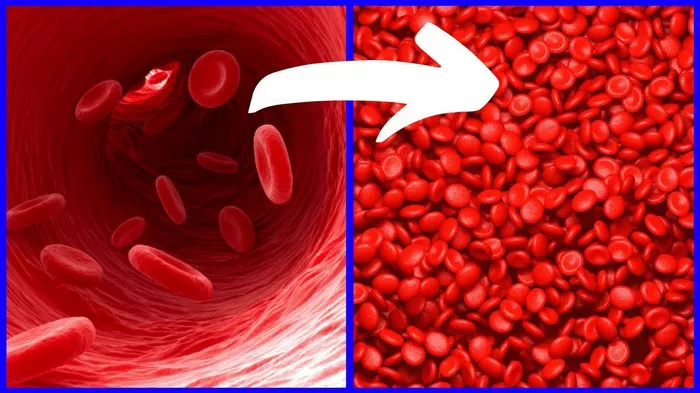High blood pressure, also known as hypertension, is a common medical condition that affects millions of people worldwide. It is characterized by elevated blood pressure levels, which can increase the risk of cardiovascular diseases such as heart attack and stroke. While several factors contribute to high blood pressure, including genetics, lifestyle, and diet, there is a debate about whether high levels of red blood cells (RBCs) can cause or contribute to hypertension. In this article, we will explore the relationship between high RBC counts and high blood pressure, examining the scientific evidence and discussing potential mechanisms and implications.
Understanding Red Blood Cells (RBCs) and Blood Pressure
Red blood cells, also known as erythrocytes, are a vital component of the blood responsible for carrying oxygen from the lungs to tissues throughout the body. The production and regulation of RBCs are tightly controlled by the body’s feedback mechanisms, primarily through the hormone erythropoietin (EPO), which is produced by the kidneys in response to low oxygen levels. High RBC counts, also known as erythrocytosis or polycythemia, can occur due to various reasons, including genetic factors, chronic hypoxia (low oxygen levels), certain medical conditions such as polycythemia vera, and exposure to high altitudes.
The Link Between High RBC and Blood Pressure
The relationship between high RBC counts and blood pressure is complex and multifactorial. While some studies suggest a potential association between erythrocytosis and hypertension, the exact mechanisms and causative factors are not fully understood. Here are some key points to consider regarding this topic:
1. Hyperviscosity and Blood Flow: One proposed mechanism linking high RBC counts to elevated blood pressure is hyperviscosity, which refers to the thickness or stickiness of the blood. Increased RBC levels can lead to higher blood viscosity, making it more difficult for blood to flow smoothly through blood vessels. This may contribute to higher blood pressure readings, especially in smaller blood vessels where the resistance to blood flow is greater.
2. Impact on Blood Volume: Another factor to consider is the effect of high RBC counts on blood volume. Erythrocytosis can lead to an increase in total blood volume, which, in turn, can put additional strain on the cardiovascular system and potentially elevate blood pressure levels.
3. Hematocrit Levels: Hematocrit refers to the percentage of blood volume occupied by RBCs. High hematocrit levels are often observed in individuals with erythrocytosis. While there is some evidence suggesting a correlation between elevated hematocrit and hypertension, further research is needed to establish a direct causal relationship.
4. Underlying Conditions: It’s essential to note that high RBC counts can occur as a result of underlying medical conditions, such as chronic lung diseases (e.g., chronic obstructive pulmonary disease or COPD), kidney disorders, and certain types of tumors. These conditions can also contribute to the development of high blood pressure through various mechanisms, independent of RBC levels.
Scientific Evidence and Studies
Research investigating the association between high RBC counts and hypertension has produced mixed results. Some studies have reported a positive correlation, especially in cases of secondary erythrocytosis caused by conditions such as chronic hypoxia or kidney disease. However, other studies have failed to establish a clear link between erythrocytosis and elevated blood pressure, suggesting that other factors may play a more significant role in hypertension development.
One study published in the Journal of Hypertension conducted a meta-analysis of several observational studies examining the relationship between hematocrit levels and blood pressure. The analysis found a modest association between higher hematocrit levels and increased risk of hypertension, particularly in individuals with secondary erythrocytosis due to chronic hypoxia. However, the authors noted the need for further prospective studies to confirm these findings and elucidate the underlying mechanisms.
Clinical Implications and Management
The potential association between high RBC counts and high blood pressure has clinical implications, especially for individuals with conditions that can lead to erythrocytosis. In such cases, healthcare providers may monitor blood pressure closely and consider interventions to manage both the underlying cause of erythrocytosis and hypertension. This may include treatments such as oxygen therapy for chronic hypoxia, medications to reduce blood viscosity, and lifestyle modifications to control blood pressure levels.
It’s crucial to emphasize that hypertension is a complex condition influenced by multiple factors, including genetics, lifestyle choices (e.g., diet, physical activity), age, and comorbidities. While high RBC counts may contribute to elevated blood pressure in certain individuals, they are not the sole determinant, and a comprehensive approach to hypertension management is necessary.
Conclusion
In conclusion, the relationship between high RBC counts and high blood pressure is a topic of ongoing research and debate within the medical community. While some evidence suggests a potential association, the exact mechanisms and causative factors remain unclear. Further studies are needed to better understand the role of erythrocytosis in hypertension development and its clinical implications. In the meantime, healthcare providers should consider individual patient characteristics, underlying conditions, and overall cardiovascular risk factors when assessing and managing hypertension in clinical practice.


